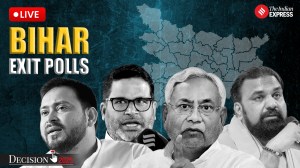How Karnataka political discord has been brewing: Before latest flashpoint, Governor returned 11 Bills in 8 months
While the Siddaramaiah government is not mulling a legal recourse like the DMK government in Tamil Nadu, it has accused Governor Thaawar Chand Gehlot of overreach.
 Gehlot who first received the Public Examination Bill for clearance last December returned it on January 16 for the second time, citing a lack of “adequate consultations with concerned authorities”. (Express file photo)
Gehlot who first received the Public Examination Bill for clearance last December returned it on January 16 for the second time, citing a lack of “adequate consultations with concerned authorities”. (Express file photo)Taking a leaf out of his Tamil Nadu counterpart R N Ravi’s playbook and in the backdrop of his ongoing tussle with the state government, Karnataka Governor Thaawar Chand Gehlot has sought clarifications and returned 11 Bills to the legislature over the past eight months.
While the Siddaramaiah-led Karnataka government is not mulling a legal recourse on the lines of the DMK government in Tamil Nadu — it approached the Supreme Court last year over the delay in clearing Bills — the move has evoked a strong response from it.
“The Governor’s recent moves definitely amount to overreach (of gubernatorial position). He is seeking clarifications and asking questions, things which are not his domain. Such moves threaten the sanctity of the legislature,” Karnataka Revenue Minister Krishna Byre Gowda said with regard to the Registration (Karnataka Amendment) Bill, 2024, which provides for technical registration of properties by submission of documents online.
Gowda said the amendments have been enforced in Maharashtra and Madhya Pradesh, from where Gehlot hails. “The Governor cannot question the will of the state legislature, which represents the will of the people. Once a Bill is passed, its legality can be questioned only in the court of law,” he said.
According to documents accessed by The Indian Express, six of the 11 Bills were sent back in August. Of these four were returned to the legislature on August 17, the day Gehlot granted sanction for prosecuting Siddaramaiah in the alleged Mysuru Urban Development Authority (MUDA) scam and set off a political storm. Clarifications on two other Bills were sought a day earlier.
The “delay” in clearing Bills was also raised on August 23 by Deputy Chief Minister D K Shivakumar, who accused Gehlot of working at the behest of the BJP.
The Bills returned by Gehlot include The Karnataka Public Examination (Measures for Prevention of Corruption and Unfair Means in Recruitment) Bill, 2023, which aims to impose heavy penalties for those involved in paper leaks; the Registration (Karnataka Amendment) Bill, 2024; and other Bills aimed at increasing state government revenue such as the Karnataka Municipalities and Certain Other Law (Amendment) Bill, 2024, and the Town and Country Planning (Amendment) Bill, 2024.
Gehlot who first received the Public Examination Bill for clearance last December returned it on January 16 for the second time, citing a lack of “adequate consultations with concerned authorities”. The Bill was drafted in the wake of alleged irregularities in the police sub-inspector recruitment scam during the tenure of the previous BJP government.
On the Town and Country Planning Bill, the Governor’s office returned it citing “16 observations and objections” received from the Citizens Action Forum and RTI activists. “It is also not clarified what are the positive and negative effects of this amendment. It is also necessary to ascertain whether this amendment is technical and valid or not,” stated a July 27 note accompanying the Governor’s response to the Bill.
The Karnataka Religious Institutions and Charitable Endowments (Amendment) Bill, 2024, which was passed in March and proposed a common pool fund under the Hindu Religious Institutions and Charitable Endowments Department to improve amenities at smaller temples, insurance cover, and compensation for families after the death of priests. among others, also did not get the assent of the Governor. “Has the state government conceptualised any legislation to encompass other religious bodies in a similar fashion as this Bill?” read the clarification sought from Gehlot’s office.
The reasons for holding up the Karnataka Co-operative Societies (Amendment) Bill, 2024, and the Gadag-Betageri Vyapara Mattu Vastu Pradarshana Padhikara Bill, 2024, also triggered a strong response from the state government.
Gehlot returned the Co-operative Societies Bill citing the memorandum submitted by the Leader of the Opposition in the Legislative Assembly R Ashoka, which stated that the amendment for further reservation was not required and was in violation of an agreement signed with NABARD. The Gadag-Betageri Bill was returned, with the Governor saying that the government had not discussed its provisions with the BJP-ruled local body and elected representatives and the city municipal council had resolved to reject it.
“Returning Bills passed by the legislature based on the objections of a city municipal council or the Opposition is unprecedented. At no point in time have Governors returned them (Bills) for resubmission based on the content. Sending Bills back or delaying them is not a healthy sign,” Karnataka Law and Parliamentary Affairs Minister H K Patil told The Indian Express.
Patil said suggestions for consultations should not have come from the Governor. “The government is aware of its duties. The Bills were passed only after discussions in the Assembly and Council. The government will fulfil its obligations and respond to the Governor,” he said.
On the other hand, the Municipalities Bill, which was returned on August 16, sought to know if the amendments introduced were “legally valid”. The Governor claimed the provisions aimed to generate revenue for the urban local bodies and also “bring all unauthorised sites and buildings within the bracket of property tax”.



- 01
- 02
- 03
- 04
- 05




























